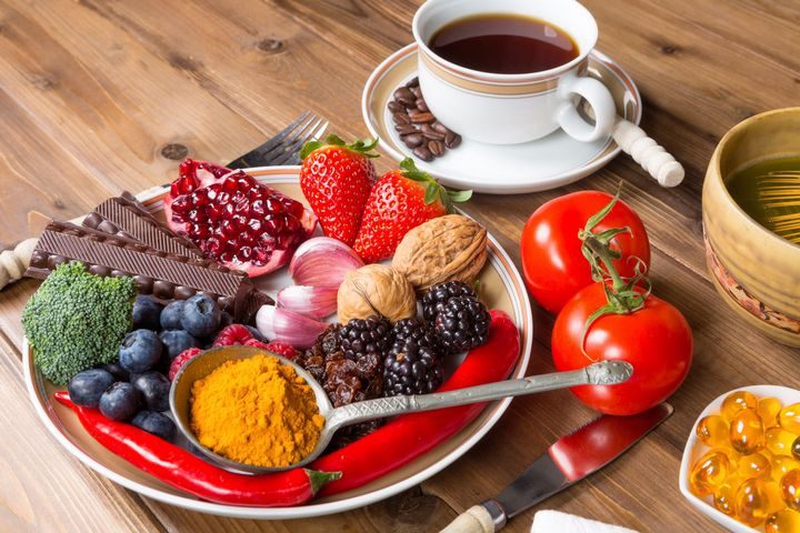There’s a popular saying that goes “we are what we eat”.
More and more people are becoming conscious of their health so they try to be careful in selecting the food that they let into their body. We all want a healthy body so we eat foods that are good for our heart or gut. Then how about the foods that can protect your cell? You have probably heard of the buzzy term called antioxidants and that foods that are high with antioxidants help protects our cells.
Are you familiar with antioxidants and what its benefits? Read on to learn more about it.

What Are Antioxidants?
Antioxidants, as implied in its name, are nutrients and enzymes that counteract or prevent cell damages. They are called antioxidants as they help fight or prevent cell damage caused by oxidants. They play a huge role in minimizing the risk of developing chronic diseases like heart disease, cancer, Alzheimer’s disease, stroke, cataracts and Rheumatoid arthritis.
Antioxidants are found in many plant-based foods such as vegetables, fruits, tea, coffee, chocolate and wine. There are a lot of antioxidants compound, however, the most popular are resveratrol (found in wine), flavanols (found in chocolate), lycopene (found in tomatoes), catechins and vitamins C, A (beta-carotene) and E.
Antioxidants have three primary types and they are:
Phyto-chemicals – This is a type of antioxidants that is made by plants to give themselves protection from free radicals. Flavonoids, carotenoids, polyphenols, Allyl sulphides, etc. belong to this. It is said that people who have diet composed of foods that are rich in phytochemicals also get the same benefits from the antioxidant properties of the plant.
Enzymes – These are manufactured by our body. They are made from minerals and proteins in the food that we eat, which include glutathione peroxidase, superoxide dismutase, catalases and glutathione reductase.
Vitamins – Since our body is not capable of producing vitamins, it is important that our diet contains antioxidant vitamins such as vitamins C, A, E, beta-carotene and folic acid.
Benefits of Antioxidants
Antioxidants and free radicals
Our body naturally produces free radicals which are bad for our health, however, in most cases, the natural antioxidants are outnumbered by the free radicals. So antioxidants are needed to help the body in balancing and removing free radicals from our bloodstream.
Antioxidants and Skin Health
Our skin has high risk of being damaged if it’s exposed to high levels of ultraviolet light. It results to skin diseases and impurities such as premature aging, photodermatoses and even skin cancer. One of the most powerful antioxidant that is known for its ability in protecting our skin is astaxanthin. Combine it with vitamin E and beta-carotene for a more potent skin protection.
Antioxidants and Immune System
We are exposed to thousands of bacteria and germs every day but thanks to our immune system, it protects us from illness and diseases caused by these particles. It is important that we have a strong immune system to be at the top of our health. It’s hard though to boost our immune system when we are constantly in contact with free radicals. Then antioxidants help a lot. What are antioxidants’ roles in boosting your immune system exactly?
Vitamin C – It helps in the production of antibodies and white blood cells. It also prevents viruses from entering your body by increasing the production of interferon.
Vitamin E – It increases the production of natural killer cells. It also helps in manufacturing of B cells which makes antibodies. Vitamin E can also reverse the natural decline of immune system’s function associated with aging.
Carotenoid – It increases the production of helper T-cells and natural killer cells.
Bioflavonoid – It helps prevent germs from entering your body.
Additional benefit of antioxidants
It’s hard to maintain an optimum health in this polluted world, however, antioxidant makes it possible. Making sure that you have enough antioxidant intake daily gives your body an added protection from memory problem, eye problem, heart problem, immune system problem and mood disorders.
How to Get Antioxidants
Diets
These super foods are packed with antioxidants:
Small red bean – half cup contains 13,727 antioxidants per serving
Wild blueberry – 1 cup contains 13,427 antioxidants per serving
Red kidney bean – half cup contains 13,259 antioxidants per serving
Pinto bean – half cup contains 11,864 antioxidants per serving
Blueberry – 1 cup contains 9,019 antioxidants per serving
Cranberry – 1 cup contains 8,983 antioxidants per serving
Artichoke – 1 cup contains 7,904 antioxidants per serving
Blackberry – 1 cup contains 7,701 antioxidants per serving
Prune – half cup contains 7,291 antioxidants per serving
Raspberry – 1 cup contains 6,058 antioxidants per serving
Other great sources of antioxidants are apple, pecan, potato, black plum, black bean, and strawberry.
Supplements
Though you can get your daily fix from supplements, it is still recommended that you get your antioxidants from fruits and vegetables since taking high dosage of supplements can provide harm and side effects.
If you have plans of taking a dietary supplement, always consult with your doctor first, especially if you are undergoing a medical treatment or taking other forms of prescription drugs. Talk with your doctor first if you are pregnant or breastfeeding.
These are the things that you should keep in mind when you are taking antioxidant supplements:
Dietary supplements, just like with conventional medicines, may trigger allergic reaction or result to negative side effect. It may also interact with other supplements or medications that you are currently taking.
There is no standardization when it comes to manufacturing dietary supplements. This means that each brand works differently or causes negative side effect.
There is still no study that proves taking antioxidant supplement has a long-term effect.
In conclusion, antioxidants are generally safe, especially if you consult with your doctor first and follow the recommended dosage. However, it is still better that you go the natural way – that is getting your source from fruits and vegetables.
View All Comments /Add Comment